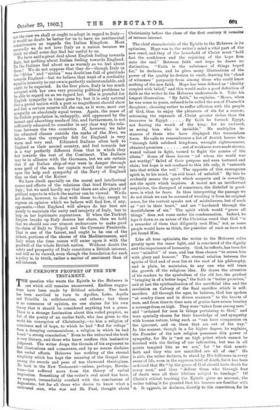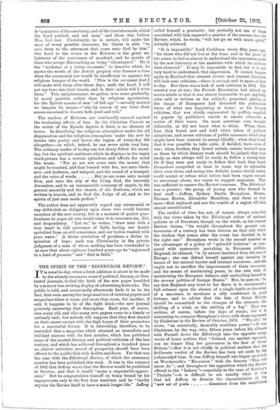AN UNKNOWN PROPHET OF THE NEW TESTAMENT. T HE question who
wrote the Epistle to the Hebrews is one which still remains unanswered. Endless sugges- tions have been made by Biblical scholars. The book has been ascribed in turn to Apollos, Luke, Aquila and Priscilla in collaboration, and others ; but there is no consensus of opinion, no one claims for his own theory that it should be considered anything but a guess. There is a strange fascination about this veiled prophet, so full of the poetry of an earlier faith, who has given to the world his conception of Christianity,—to him a religion of conscience and of hope, to which he had "fled for refuge" from a decaying ceremonialism, a religion in which he had found "a strong consolation." Even to the unlearned the book is very literary, and those who know confirm this instinctive Judgment. The writer drops the threads of his argument to find illustrations and ornaments, and by no means disdains fin e verbal effects. Hebrews has nothing of the eternal simplicity which has kept the meaning of the Gospel clear among the swords and pens of ten thousand theologians. No book in the New Testament—unless, perhaps, Revela- tions—ht suffered more from the theory of verbal nuilnration. Something of the writer's real mind has been, we inspect, irremediably overlaid with the conclusions of abate; ; but for all those who desire to know what a cultivated man, who was not St. Paul, thought about
the close of the first century it remains
The chief characteristic of the Epistle to the Hebrews is its optimism. Hope was to the writer's mind a vital part of the new creed, and they of the household of Christ must "hold fast the confidence and the rejoicing of the hope firm unto the end." Between faith and hope he draws no distinction. "Faith is the substance of things hoped for," he declares, and he gives many illustrations of the power of the quality he desires to exalt, drawing his " cloud of witnesses " purposely from among those who could know nothing of the new faith. Hope has been defined as " ideality coupled with belief," and this would make a good definition of faith as the writer to the Hebrews understands it. Take his longest illustration. " By faith," he explains, " Moses, when he was come to years, refused to be called the son of Pharaoh's daughter ; choosing rather to suffer affliction with the people of God, than to enjoy the pleasures of sin for a season; esteeming the reproach of , Christ greater riches than the
treasures in Egypt By faith he forsook Egypt, not fearing the wrath of the king : for he endured, as seeing him who is invisible." He multiplies in- stances of those who have displayed this tremendous force. He calls to remembrance a list of Jewish heroes who "through faith subdued kingdoms, wrought righteousness, obtained promises out of weakness were made strong, waxed valiant in fight, turned to flight the armies of the aliens." Some of these heroes " (of whom the world was not worthy)" failed of their purpose and were tortured and slain; but hope is not confined to this life only, it " entereth into that within the veil." The opposite of this courageous spirit is, to his mind, " an evil heart of unbelief." By this he evidently means the spirit which suspects and is cowardly, not the spirit which inquires. A moral not an intellectual scepticism, the disregard of conscience, the disbelief in good- ness, is what he fears. In thus interpreting the passage we do not think we can be accused of wresting it from its original sense, for the context speaks not of misbelievers, but of such as " err in their heart," and are " hardened through the deceitfulness of sin." The spirit which would " prove all things" does not come under his condemnation. Indeed, be lays it down as an axiom of the Christian creed that God " is a rewarder of them that diligently seek Him," not, as some people would have us think, the punisher of such as have not yet found Him.
Like all true optimists, the writer to the Hebrews relies greatly upon the inner light, and is convinced of the dignity and the importance of humanity. God, he reflects, has been for ever " mindful" of man, and has thus chosen " to crown him with glory and honour." The eternal relation between the spirits of God and of man lies at the root of his philosophy, and is plain, he maintains, to any one who will trace the growth Of the religious idea.. He draws the attention of his readers to the symbolism of the old law, the gradual "bringing in of a better hope," the faith in "better promises," and at last the spiritualisation of the sacrificial idea and the revelation on Calvary of the final sacrifice which is self- sacrifice. All through the ages, he believes, God has spoken "at sundry times and in divers manners " to the hearts of men, and from time to time men of genius have arisen bearing a message from on high. They were "taken from among men " and "ordained for men in things pertaining to God," and were specially chosen for their knowledge of and sympathy with human nature, being such as " can have compassion on the ignorant, and on them that are out of the way." In like manner, though in a far higher degree, he explains, the Founder of the new religion possesses this power of sympathy, for He is "not an high priest which cannot be touched with the feeling of our infirmities, but was in all points tempted like as we are," for " he that sancti- fieth and they who are sanctified are all of one." He is able, the writer declares, to stand by His followers in every event of life, even in the supreme trial of death, for it has been ordained that He "by the grace of God should taste death for every man," and thus " deliver them who through fear of death were all their lifetime subject to bondage?' Of Christ's ethical teaching the Epistle gives no account, the writer taking it for granted that his hearers are familiar with it It appeals, ue declares, directly to the conscience, for he
is "a minister of the sanctuary, and of the true tabernacle, which the Lord pitched, and not men," and those who believe Him find rest. Christianity, he is certain, will make the most of every possible character, for Christ is able " to save them to the uttermost that come unto God by him." Our Lord to the writer to the Hebrews is the great en- lightener of the conscience of mankind, and he speaks of those who accept His teaching as being " illuminated." He is the " mediator of a better covenant," to describe which he quotes the words of the Jewish prophet who foresaw a time when the ceremonial law would be insufficient to appease the religious hunger of the world. " This is the covenant that I will make with them after those days, saith the Lord, I will put my laws into their hearts, and in their minds will I write them." This enlightenment, we gather, is to come gradually, by moral practice rather than by religious speculation, for the Epistle speaks of men " of full age "—morally mature we imagine he means—" who by reason of use have their senses exercised to discern both good and evil."
The readers of Hebrews are continually warned against the weakening effects of fear. In the Christian Church as the writer of the Epistle depicts it there is no element of terror. In describing the religious atmosphere under the old dispensation and the religious atmosphere under the new he breaks into poetry and leaves the region of every-day life altogether,—in which, indeed, he can never abide very long. The ordinary reader of to-day can but dimly follow his mean- ing, but the spiritual antithesis which he displays in his vague word-picture has a certain splendour, and affects the mind like music. " For ye are not come unto the mount that might be touched, and that burned with fire, nor unto black- ness, and darkness, and tempest, and the sound of a trumpet, and the voice of words But ye are come unto mount Sion, and unto the city of the living God, the heavenly Jerusalem, and to an innumerable company of angels, to the general assembly and the church of the firstborn, which are written in heaven, and to God the Judge of all, and to the spirits of just men made perfect."
The author does not apparently regard any ceremonial or any shibboleth as obligatory upon those who would become members of the new society, but in a moment of quaint- prac- ticalness be urges all who would enter it to renounce sin, dirt, and despondency. " Let us," he writes, " draw near with a true heart in full assurance of faith, having our hearts sprinkled from an evil conscience, and our bodies washed with pure water." A divine revelation of goodness, a divine in- spiration of hope : such was Christianity in the private judgment of a man of whom nothing has been vouchsafed to us save that about eighteen hundred years ago he "sojourned in a land of promise" and " died in faith."











































 Previous page
Previous page